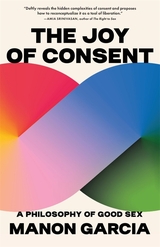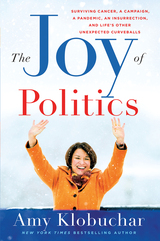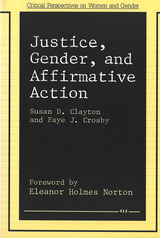123 books about Critical Theory and 7
start with T
123 books about Critical Theory and 7
123 books about Critical Theory
7 start with T start with T
7 start with T start with T
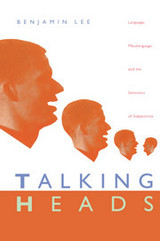
Talking Heads
Language, Metalanguage, and the Semiotics of Subjectivity
Benjamin Lee
Duke University Press, 1997
In Talking Heads, Benjamin Lee situates himself at the convergence of multiple disciplines: philosophy, linguistics, anthropology, and literary theory. He offers a nuanced exploration of the central questions shared by these disciplines during the modern era—questions regarding the relations between language, subjectivity, community, and the external world. Scholars in each discipline approach these questions from significantly different angles; in seeking to identify and define the intersection of these angles, Lee argues for the development of a new sense of subjectivity, a construct that has repercussions of immense importance beyond the humanities and into the area of politics.
Talking Heads synthesizes the views and works of a breathtaking range of the most influential modern theorists of the humanities and social sciences, including Austin, Searle, Derrida, Jakobson, Bakhtin, Wittgenstein, Peirce, Frege, Kripke, Donnellan, Putnam, Saussure, and Whorf. After illuminating these many strands of thought, Lee moves beyond disciplinary biases and re-embeds within the context of the public sphere the questions of subjectivity and language raised by these theorists. In his examination of how subjectivity relates not just to grammatical patterns but also to the specific social institutions in which these patterns develop and are sustained, Lee discusses such topics as the concept of public opinion and the emergence of Western nation-states.
Talking Heads synthesizes the views and works of a breathtaking range of the most influential modern theorists of the humanities and social sciences, including Austin, Searle, Derrida, Jakobson, Bakhtin, Wittgenstein, Peirce, Frege, Kripke, Donnellan, Putnam, Saussure, and Whorf. After illuminating these many strands of thought, Lee moves beyond disciplinary biases and re-embeds within the context of the public sphere the questions of subjectivity and language raised by these theorists. In his examination of how subjectivity relates not just to grammatical patterns but also to the specific social institutions in which these patterns develop and are sustained, Lee discusses such topics as the concept of public opinion and the emergence of Western nation-states.
[more]
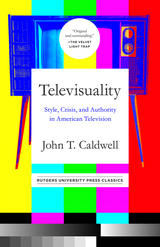
Televisuality
Style, Crisis, and Authority in American Television
John T Caldwell
Rutgers University Press, 2020
Although the "decline" of network television in the face of cable programming was an institutional crisis of television history, John Caldwell's classic volume Televisuality reveals that this decline spawned a flurry of new production initiatives to reassert network authority. Television in the 1980s hyped an extensive array of exhibitionist practices to raise the prime-time marquee above the multi-channel flow. Televisuality demonstrates the cultural logic of stylistic exhibitionism in everything from prestige series (Northern Exposure) and "loss-leader" event-status programming (War and Remembrance) to lower "trash" and "tabloid" forms (Pee-Wee's Playhouse and reality TV). Caldwell shows how "import-auteurs" like Oliver Stone and David Lynch were stylized for prime time as videographics packaged and tamed crisis news coverage. By drawing on production experience and critical and cultural analysis, and by tying technologies to aesthetics and ideology, Televisuality is a powerful call for desegregation of theory and practice in media scholarship and an end to the willful blindness of "high theory."
[more]
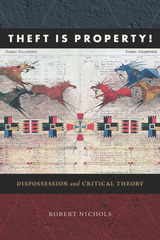
Theft Is Property!
Dispossession and Critical Theory
Robert Nichols
Duke University Press, 2020
Drawing on Indigenous peoples' struggles against settler colonialism, Theft Is Property! reconstructs the concept of dispossession as a means of explaining how shifting configurations of law, property, race, and rights have functioned as modes of governance, both historically and in the present. Through close analysis of arguments by Indigenous scholars and activists from the nineteenth century to the present, Robert Nichols argues that dispossession has come to name a unique recursive process whereby systematic theft is the mechanism by which property relations are generated. In so doing, Nichols also brings long-standing debates in anarchist, Black radical, feminist, Marxist, and postcolonial thought into direct conversation with the frequently overlooked intellectual contributions of Indigenous peoples.
[more]
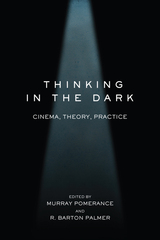
Thinking in the Dark
Cinema, Theory, Practice
Pomerance, Murray
Rutgers University Press, 2015
Today’s film scholars draw from a dizzying range of theoretical perspectives—they’re just as likely to cite philosopher Gilles Deleuze as they are to quote classic film theorist André Bazin. To students first encountering them, these theoretical lenses for viewing film can seem exhilarating, but also overwhelming.
Thinking in the Dark introduces readers to twenty-one key theorists whose work has made a great impact on film scholarship today, including Rudolf Arnheim, Sergei Eisenstein, Michel Foucault, Siegfried Kracauer, and Judith Butler. Rather than just discussing each theorist’s ideas in the abstract, the book shows how those concepts might be applied when interpreting specific films by including an analysis of both a classic film and a contemporary one. It thus demonstrates how theory can help us better appreciate films from all eras and genres: from Hugo to Vertigo, from City Lights to Sunset Blvd., and from Young Mr. Lincoln to A.I. and Wall-E.
The volume’s contributors are all experts on their chosen theorist’s work and, furthermore, are skilled at explaining that thinker’s key ideas and terms to readers who are not yet familiar with them. Thinking in the Dark is not only a valuable resource for teachers and students of film, it’s also a fun read, one that teaches us all how to view familiar films through new eyes.
Theorists examined in this volume are: Rudolf Arnheim, Béla Balázs, Roland Barthes, André Bazin, Walter Benjamin, Judith Butler, Stanley Cavell, Michel Chion, Gilles Deleuze, Jean Douchet, Sergei Eisenstein, Jean Epstein, Michel Foucault, Siegfried Kracauer, Jacques Lacan, Vachel Lindsay, Christian Metz, Hugo Münsterberg, V. F. Perkins, Jacques Rancière, and Jean Rouch.
Thinking in the Dark introduces readers to twenty-one key theorists whose work has made a great impact on film scholarship today, including Rudolf Arnheim, Sergei Eisenstein, Michel Foucault, Siegfried Kracauer, and Judith Butler. Rather than just discussing each theorist’s ideas in the abstract, the book shows how those concepts might be applied when interpreting specific films by including an analysis of both a classic film and a contemporary one. It thus demonstrates how theory can help us better appreciate films from all eras and genres: from Hugo to Vertigo, from City Lights to Sunset Blvd., and from Young Mr. Lincoln to A.I. and Wall-E.
The volume’s contributors are all experts on their chosen theorist’s work and, furthermore, are skilled at explaining that thinker’s key ideas and terms to readers who are not yet familiar with them. Thinking in the Dark is not only a valuable resource for teachers and students of film, it’s also a fun read, one that teaches us all how to view familiar films through new eyes.
Theorists examined in this volume are: Rudolf Arnheim, Béla Balázs, Roland Barthes, André Bazin, Walter Benjamin, Judith Butler, Stanley Cavell, Michel Chion, Gilles Deleuze, Jean Douchet, Sergei Eisenstein, Jean Epstein, Michel Foucault, Siegfried Kracauer, Jacques Lacan, Vachel Lindsay, Christian Metz, Hugo Münsterberg, V. F. Perkins, Jacques Rancière, and Jean Rouch.
[more]
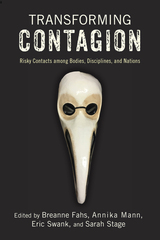
Transforming Contagion
Risky Contacts among Bodies, Disciplines, and Nations
Fahs, Breanne
Rutgers University Press, 2018
2019 Choice Outstanding Academic Title
Moving from viruses, vaccines, and copycat murder to gay panics, xenophobia, and psychopaths, Transforming Contagion energetically fuses critical humanities and social science perspectives into a boundary-smashing interdisciplinary collection on contagion. The contributors provocatively suggest contagion to be as full of possibilities for revolution and resistance as it is for the descent into madness, malice, and extensive state control. The infectious practices rooted in politics, film, psychological exchanges, social movements, the classroom, and the circulation of a literary text or meme on social media compellingly reveal patterns that emerge in those attempts to re-route, quarantine, define, or even exacerbate various contagions.
Moving from viruses, vaccines, and copycat murder to gay panics, xenophobia, and psychopaths, Transforming Contagion energetically fuses critical humanities and social science perspectives into a boundary-smashing interdisciplinary collection on contagion. The contributors provocatively suggest contagion to be as full of possibilities for revolution and resistance as it is for the descent into madness, malice, and extensive state control. The infectious practices rooted in politics, film, psychological exchanges, social movements, the classroom, and the circulation of a literary text or meme on social media compellingly reveal patterns that emerge in those attempts to re-route, quarantine, define, or even exacerbate various contagions.
[more]
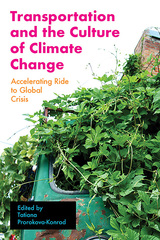
Transportation and the Culture of Climate Change
Accelerating Ride to Global Crisis
Tatiana Prorokova-Konrad
West Virginia University Press, 2020
This interdisciplinary collection of eleven original essays focuses on the environmental impact of transportation, which is, as Tatiana Prorokova-Konrad and Brian C. Black note in their introduction, responsible for 26 percent of global energy use. Approaching mobility not solely as a material, logistical question but as a phenomenon mediated by culture, the book interrogates popular assumptions deeply entangled with energy choices. Rethinking transportation, the contributors argue, necessarily involves fundamental understandings of consumption, freedom, and self.
The essays in Transportation and the Culture of Climate Change cover an eclectic range of subject matter, from the association of bicycles with childhood to the songs of Bruce Springsteen, but are united in a central conviction: “Transport is a considerable part of our culture that is as hard to transform as it is for us to stop using fossil fuels—but we do not have an alternative.”
The essays in Transportation and the Culture of Climate Change cover an eclectic range of subject matter, from the association of bicycles with childhood to the songs of Bruce Springsteen, but are united in a central conviction: “Transport is a considerable part of our culture that is as hard to transform as it is for us to stop using fossil fuels—but we do not have an alternative.”
[more]

The Treadmill Affect
Marxism, Subjectivity, and the Present
Benjamin Lee
Prickly Paradigm Press, 2025
A critical synthesis of the work of Lauren Berlant, Moishe Postone, and Michael Silverstein.
The Treadmill Affect draws upon the work of three University of Chicago professors, each a former program director at the Center for Transcultural Studies: literary and cultural critic Lauren Berlant, historian and social theorist Moishe Postone, and linguist Michael Silverstein. Through this intellectual synthesis, Benjamin Lee demonstrates the critical possibilities of uniting a revived linguistic turn with Marxist accounts of affect and subjectivity, adding new dimensions to the "treadmill" affective structure of cruel optimism.
The Treadmill Affect draws upon the work of three University of Chicago professors, each a former program director at the Center for Transcultural Studies: literary and cultural critic Lauren Berlant, historian and social theorist Moishe Postone, and linguist Michael Silverstein. Through this intellectual synthesis, Benjamin Lee demonstrates the critical possibilities of uniting a revived linguistic turn with Marxist accounts of affect and subjectivity, adding new dimensions to the "treadmill" affective structure of cruel optimism.
[more]
READERS
Browse our collection.
PUBLISHERS
See BiblioVault's publisher services.
STUDENT SERVICES
Files for college accessibility offices.
UChicago Accessibility Resources
home | accessibility | search | about | contact us
BiblioVault ® 2001 - 2025
The University of Chicago Press


